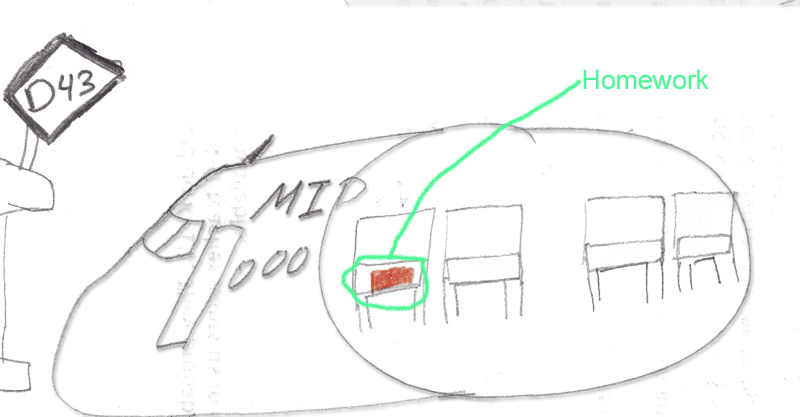“The facts show that scheduled airlines offered more seats in 2006 than ever before with more than three billion seats being made available to the flying public,” said Duncan Alexander, managing director, OAG. “At a very conservative estimate of a 70 percent load factor that means over 2.3 billion passengers will have flown during 2006. That is more than 6.3 million people flying every day of the year on either business or leisure.”
“Given the schedules already in the OAG system for the first quarter of 2007, the trend of more seats and flights being offered by the world’s scheduled airlines, and more people flying on both long and short haul, looks to continue,” he said.
Category: Travel
Top 10 National Geographic 2006 Photos
Purported pyramids, giant jellyfish, and a number of pythons that swallowed more than they bargained for were among the stars of this year’s most popular news photos.
Details on AirTran’s Midwest Desires
A two-month exchange of letters between Leonard and Hoeksema, published in an AirTran filing with the Securities and Exchange Commission, reveals that Midwest rejected an initial AirTran proposal more than a year ago–for $4.25 per share, according to Skornicka–and that things got testy in mid-November after Hoeksema told Leonard he would present an assessment of the offer to Midwest’s board at its regular meeting on Dec. 6.
Leonard replied Nov. 22 that it was “unacceptable” for Hoeksema to wait for the board’s next regular meeting and suggested that Midwest’s management wasn’t carrying out its fiduciary duty to shareholders. He also hinted at a hostile-takeover attempt–“[O]ur passive response to your rejection of our original offer is not the pattern that you can continue to expect from us.” Hoeksema reassured Leonard Nov. 27 that Midwest wasn’t dragging its feet.
ALSO, LEONARD TOLD Hoeksema that the merged airline would “significantly increase jobs in a way that Midwest could never do under any possible scenario,” and that it would “materially improve the scope and frequency of air service in Milwaukee and Kansas City . . . far beyond anything Midwest can offer as an independent company.” Milwaukee and Kansas City are the origins or destinations of 83% and 13% of Midwest’s service, respectively.
Nice bit of digging in AirTran’s SEC filings. Nothing good will happen if the AirTran takeover occurs. Dennis McCann recently gave both a try.
Nothing Good Will Come of a Midwest / Airtran Merger….
AirTran Holdings is roughly a tenth the size of its main competitor, Delta Air Lines. So AirTran executives would seem unlikely cheerleaders of a potential merger that would make Delta 60 percent larger.
But the recent $8.5 billion takeover offer for Delta by US Airways has found a fan in Joseph B. Leonard, chief executive at AirTran, which, like Delta, flies routes across the Southeast from its hub in Atlanta.
“I’m rooting for it,” Mr. Leonard said yesterday in an interview, after announcing his own proposed takeover of Midwest Air, an airline based in Oak Creek, Ill., for $290 million.
Mr. Leonard may relish his role as underdog but that is not why he hopes the carriers merge — he just wants to see fewer jets in the sky. After all, US Airways’ proposed takeover would reduce the two airlines’ combined jet fleet about 10 percent.
24 Hour US Air Traffic Animation
This is a very interesting sight. It depicts flights across the U.S. in time-lapse over a couple of 24 hour periods.
It has already garnered nine awards:
#49 – Most Viewed (All Time) – Arts & Animation – All #39 – Most Viewed (All Time) – Arts & Animation – English #87 – Top Rated (All Time) – Arts & Animation – All #37 – Most Discussed (All Time) – Arts & Animation – All #27 – Most Discussed (All Time) – Arts & Animation – English #46 – Top Favorites (All Time) – Arts & Animation – All #39 – Top Favorites (All Time) – Arts & Animation – English #79 – Recently Featured – All #16 – Recently Featured – Arts & Animation – All
Greek Blue Cave Photo Gallery
These two beautiful arches are located near the Blue Caves at the north end of the Greek island of Zakynthos. Unfortunately the boat trip from the city of Zakynthos to the Blue Caves no longer visits these arches. Photo by Dimitris Raptis, who has a very nice web page about the island of Zakynthos.
Air Travel Liberalization
Earlier this year an important study came out, taking a look at the economic impact of liberalization. And I’ve been meaning to share it with you and talk a bit about what it means for our business.
Over the past 25 years, three main forces have radically changed the airline industry: the regulatory environment, airplane/aerospace capabilities, and airline strategies/business models.
First, changes to government regulations have been critical in shaping the airline industry. Since the deregulation of the U.S. market in 1978, we’ve seen a dramatic shift in domestic and international markets. And we’ve also seen increased liberalization – even “open skies” – in international markets. This freer market access has had the effect of intensifying airline competition and causing airlines to focus more on what passengers want.
Extraordinary Service in an Era of Low Expectations

My cell phone rang, displaying an unknown number while driving home from a Thanksgiving trip via the airport. Shannon from Milwaukee’s fine airline – Midwest – called to say that one of her coworkers found homework in the seatback of the plane we just vacated. She thought it important and wanted to know if we had a FedEx number so she could send us the missing homework via an overnight package.
Let’s just ponder this customer service outlier, or “black swan [more]” for a moment. We live in an era of low expectations:
- Politics: Meet the New Boss, Same as the Old Boss:
But Ms. Pelosi’s damage to herself was already done. The well-known shortcomings of Mr. Murtha were broadcast for all to see — from his quid-pro-quo addiction to moneyed lobbyists to the grainy government tape of his involvement in the Abscam scandal a generation ago. The resurrected tape — feasted upon by Pelosi enemies — shows how Mr. Murtha narrowly survived as an unindicted co-conspirator, admittedly tempted but finally rebuffing a bribe offer: “I’m not interested — at this point.
- Black Friday retail tactics:
In Lewis Center, Ohio, near Columbus, Cindy Milsap, 43, and her daughter, Ashley, 20, woke up before dawn to drive to the nearby Wal-Mart Supercenter, which advertised a 52-inch high-definition television for $474. “We don’t really need a new TV, Ms. Milsap said. “But at that price? C’mon.”
But the bargain eluded them. The “limited quantity” in the ad, she said, was three TVs — all sold by the time the pair arrived.
Those customers left in peace.
- The oxymoron that is “airline service“:
With overcrowded airplanes, little civility in dress or demeanor of passengers, few meals, fewer amenities, industrywide salary cuts of epic proportions, and (the worst sin of all) airlines canceling pension plans because they’ve robbed the fund of hundreds of millions, far too many of America’s airline employees are shell shocked, depressed, disillusioned and resentful. In effect, we’re now an industry full of employees going through post-traumatic stress and wondering why we ever thought it was fun.
And that, in a nutshell, equates to bad and inattentive service with a “who cares” attitude. Morale, in other words, is the key, and it’s in precious short supply today.
- 2006 Airline Quality Rating website.

I remain astonished that a Midwest employee cleaning the plane found said homework, took the time to give it to someone who could find the owner, lookup their contact information, make a call, obtain the shipping information, place the papers in a FedEx package and send it our way. Everyone involved must actually care about the customer. What a concept. I hope that these words, in some small way encourage others to fly Midwest. There is indeed, no better care in the air.
